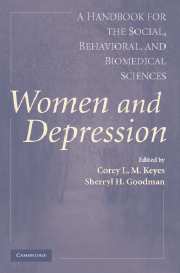Book contents
- Frontmatter
- Contents
- List of Contributors
- Foreword
- Preface
- PART I NOSOLOGY, MEASUREMENT, AND THE EPIDEMIOLOGY OF WOMEN AND DEPRESSION
- PART II BIOLOGICAL, DEVELOPMENTAL, AND AGING MODELS OF RISK
- PART III COGNITIVE, EMOTIONAL, AND INTERPERSONAL MODELS OF RISK
- PART IV SOCIAL, POLITICAL, AND ECONOMIC MODELS OF RISK
- PART V SYSTEMS AND PROCESSES OF TREATMENT, PREVENTION, AND POLICY
- Author Index
- Subject Index
Preface
Published online by Cambridge University Press: 05 June 2012
- Frontmatter
- Contents
- List of Contributors
- Foreword
- Preface
- PART I NOSOLOGY, MEASUREMENT, AND THE EPIDEMIOLOGY OF WOMEN AND DEPRESSION
- PART II BIOLOGICAL, DEVELOPMENTAL, AND AGING MODELS OF RISK
- PART III COGNITIVE, EMOTIONAL, AND INTERPERSONAL MODELS OF RISK
- PART IV SOCIAL, POLITICAL, AND ECONOMIC MODELS OF RISK
- PART V SYSTEMS AND PROCESSES OF TREATMENT, PREVENTION, AND POLICY
- Author Index
- Subject Index
Summary
Women's health research has historically centered on the topic of reproductive health. Until recently, research focused almost exclusively on biological and anatomical systems and their differences distinguishing men and women. Today, social and behavioral research on gender differences in health employs multiple disciplinary frameworks and multiple methodologies. Moreover, researchers are now seeking to better understand the causes and mechanisms that explain the higher rates of physical diseases and mental disorders in women and men.
Symptoms of depression and the diagnosis of depression are more prevalent in women. The evidence is now overwhelming that nondepressed individuals function better and are more productive than depressed individuals. Moreover, depression is prevalent, is often comorbid with other psychiatric disorders, recurs throughout the lifespan, is costly to treat, and generates substantial indirect costs to society in terms of lost productivity. Depression, then, has serious consequences whether it affects men or women. However, the fact that it is two to three times more likely to happen to women has become historically troubling because a greater percentage of women today than ever before are participating in the paid labor force in addition to their more traditional roles of raising children and tending to their families. When depression strikes women, it is disabling a central lynchpin in the structure of society.
- Type
- Chapter
- Information
- Women and DepressionA Handbook for the Social, Behavioral, and Biomedical Sciences, pp. xvii - xviiiPublisher: Cambridge University PressPrint publication year: 2006



